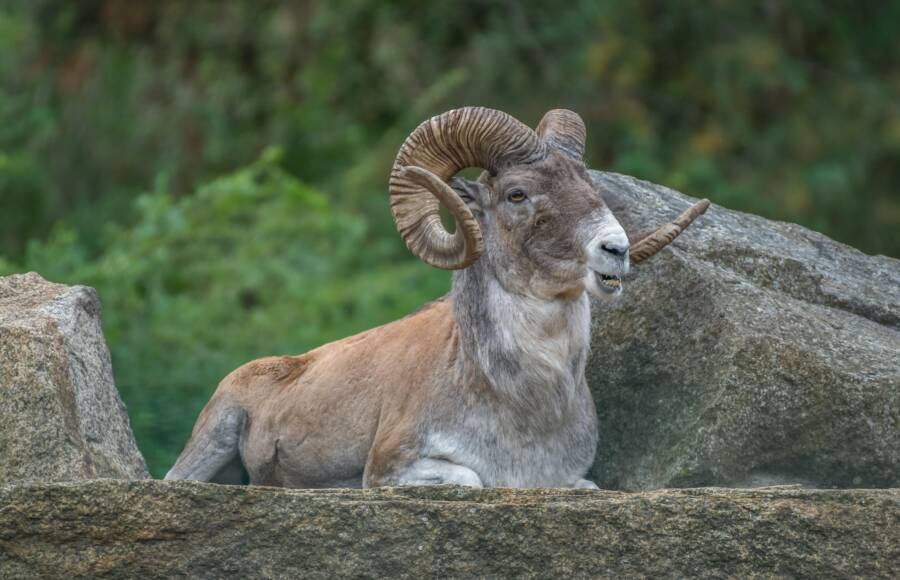Arthur "Jack" Schubarth illegally trafficked genetic material from a Marco Polo argali sheep to breed a giant hybrid species.

GmbH & Co. KG / Alamy Stock PhotoA Marco Polo argali sheep, the DNA of which was used to create the massive hybrid sheep in Montana.
A Montana farmer recently pleaded guilty to two felony wildlife crimes, admitting to having used tissue and testicles from wild animals to breed a new species of “giant” sheep for financial gain.
On March 12, 2024, 80-year-old Arthur “Jack” Schubarth of Vaughn, Montana pleaded guilty to charges of wildlife trafficking and conspiracy to traffic wildlife during a court appearance in Great Falls. He is set to be sentenced by U.S. District Court Judge Brian M. Morris on July 11, 2024.
The Scheme To Create The Hybrid Giant Sheep
Jack Schubarth is the owner of Schubarth Ranch, a Montana farm that specializes in breeding “alternative livestock” like mountain sheep, mountain goats, and other ungulates to sell to shooting preserves and game ranches.
According to a news release from the U.S. Department of Justice, Schubarth has worked for nearly a decade to create a “larger and more valuable” hybrid sheep species.
At least five other individuals are believed to have worked with Schubarth on this breeding scheme, with documents showing that the project was conducted from 2013 to 2021. The hope was to produce a hybrid species that would “garner higher prices from shooting preserves,” the statement reads.
In order to conduct this experiment, Schubarth illegally imported the tissue and testicles of a large sheep breed — the Marco Polo argali sheep (Ovis ammon polii) — from Kyrgyzstan. Native to Central Asia’s mountainous Pamir region, the Marco Polo argali sheep can weigh over 300 pounds, and its horns can measure over five feet wide.
These massive sheep are protected internationally by the Convention on International Trade in Endangered Species. They are likewise protected by the U.S. Endangered Species Act, and more specifically prohibited in Montana to protect native sheep populations from diseases and hybridization.
Schubarth sent the genetic material from the Marco Polo argali sheep parts to a lab, which then created cloned embryos of the sheep. Schubarth took those embryos, implanted them in ewes on his own ranch, and ultimately produced a pure genetic male Marco Polo argali — which he named “Montana Mountain King.”
From this single individual, Schubarth obtained multiple semen samples and, working with his collaborators, used them to artificially inseminate multiple species of ewes to produce larger hybrid animals to sell to hunting facilities.
In some cases, he also sold Montana Mountain King semen to other sheep breeders.
Of course, given the illicit nature of this breeding program, Schubarth couldn’t simply transport these prohibited sheep across state lines. So, he and his co-conspirators forged veterinary inspection certificates that falsely claimed the hybrid sheep were, in fact, legally permitted.
The Department of Justice reports that Schubarth also illegally purchased Rocky Mountain bighorn sheep parts and sold them across state lines.
A Massive Violation Of The Lacey Act
“This was an audacious scheme to create massive hybrid sheep species to be sold and hunted as trophies,” said Assistant Attorney General Todd Kim of the Justice Department’s Environment and Natural Resources Division. “In pursuit of this scheme, Schubarth violated international law and the Lacey Act, both of which protect the viability and health of native populations of animals.”
Initially passed in 1900, the Lacey Act aimed to protect wildlife by making it a federal crime to illegally trade animals across state lines. In 2008, the Lacey Act was substantially amended to include plants and plant products like timber and paper. This aimed to combat illegal logging and protect forests worldwide.
The Lacey Act makes it illegal to trade in wildlife, fish, or plants that have been taken, possessed, transported, or sold in violation of any relevant law. This includes U.S. federal, state, tribal, or foreign laws.
“The kind of crime we uncovered here could threaten the integrity of our wildlife species in Montana,” said Ron Howell, Chief of Enforcement for Montana Fish, Wildlife, and Parks. “This was a complex case and the partnership between us and U.S. Fish and Wildlife Service was critical in solving it.”
Now, Schubarth faces a maximum penalty of five years in prison, a fine of up to $250,000, and three years of supervised release for each felony count.
After reading about Arthur Schubarth and his giant sheep, meet the takin, the elusive cow-goat hybrid of the Himalayas. Then, read about the world’s woolliest sheep, Chris.





